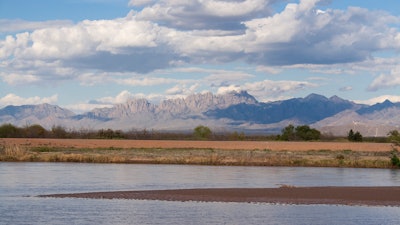
ALBUQUERQUE, N.M. (AP) — Hispanic farmers and rural residents in New Mexico are concerned legislation that would allow small cannabis producers to significantly boost their plant counts lacks a provision to ensure the producers have valid water rights.
An organization that represents traditional irrigation systems across the state, Latino and Native American agriculture groups and environmentalists are calling on lawmakers to restore what they say is critical language aimed at protecting limited water resources.
A House committee is scheduled to consider the bill Wednesday. The push comes in the waning hours of the legislative session that ends at midday Thursday.
The arid state already is struggling to meet its water demands. Experts have warned lawmakers throughout the session that supplies are expected to dwindle even more in the coming years as drought and warmer temperatures linked to climate change persist across the West.
Supporters of the legislation have described the water rights requirement as “red tape” that is keeping micro businesses from entering the recreational marijuana industry.
However, critics worry that without the requirement, the illegal use of water could go unchecked as the industry takes off in New Mexico. They point to problems elsewhere, including California where water theft by illegal marijuana growers has helped to suck dry local aquifers, leaving legitimate users without water.
Paula Garcia, head of the New Mexico Acequia Association, said it's a matter of equity. She said Native American and senior water rights holders in New Mexico are from historically underserved and marginalized communities and they stand to be put at greater risk of having their rights impaired.
“New Mexico is now in an era of long-term aridification, where we need more careful stewardship of our limited water resources and cultural integrity,” she said in a letter sent Tuesday to members of the House. “By removing the water protections, rural entities — such as mutual domestics and acequias who are entrusted with managing water at the local level — will bear the burden of enforcement. This would put our precious water resources at risk.”
The water rights requirement had been a key component of last year's debate in New Mexico to legalize the production, sale and use of recreational cannabis for adults. Retail sales are scheduled to begin April 1.
Over the last five months, state water officials have reviewed around 40 cannabis business proposals for verification of water rights. Fewer than 15% of the proposals had valid water rights configured correctly for the intended use.
Under the legislation, a license could be revoked if the grower uses water to which they do not have a legal right. The Office of the State Engineer also would be required to develop a guide regarding water rights and the legal use of water.
Critics have argued that due diligence should be done before a license is granted, not after someone is found to be illegally using water.
State water managers also have noted that increasing production limits from no more than 200 total mature cannabis plants to 1,000 plants at any one time could increase a producer's consumptive water use by fivefold.
Farmers and others have suggested that New Mexico collect at least two years of data on water use by the industry before legislators propose any changes to the water protection requirements within the cannabis act.






















